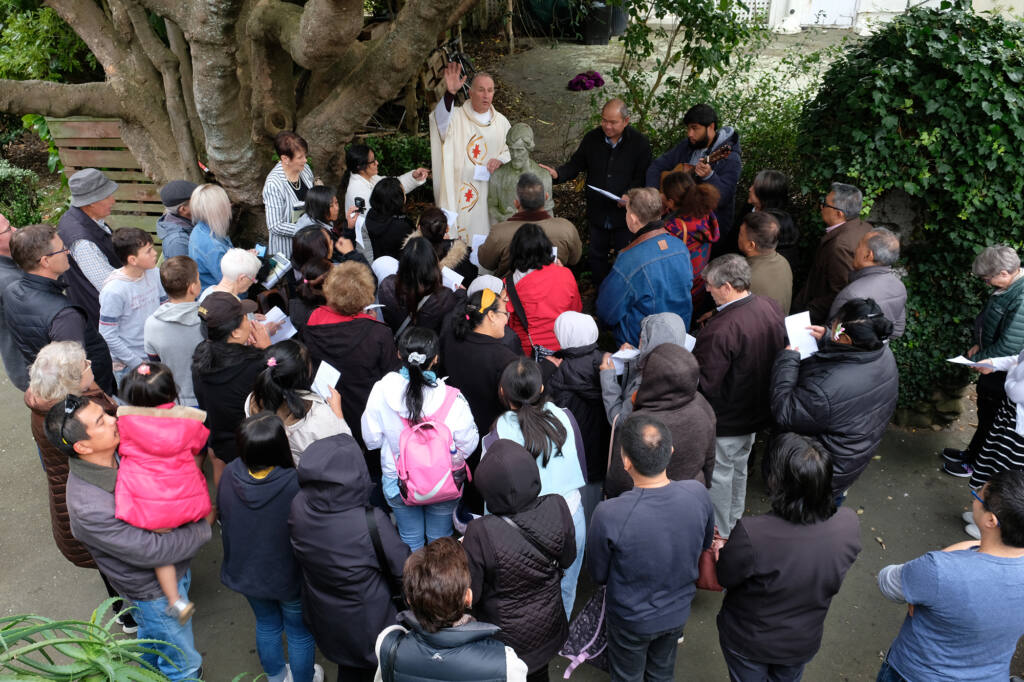WelCom June/July 2021

A special Mass at St Joseph’s Church, Mt Victoria, on Saturday 1 May was celebrated with a full congregation to honour the Feast of St Joseph the Worker, and as part of the Archdiocese’s contributions to the Year of St Joseph.
Vicar General Mons Gerard Burns officiated. In his homily about St Joseph as a worker and Catholic social teachings (CST) around work and employment, Mons Gerard held up a Peruvian crucifix showing a sugar-cane worker crucified onto his work tools. It was a visible and tangible way to sum up the basic thrust of CST around work, that ‘Our work should lead us to resurrection rather than crucifixion.’
About 50 gathered after Mass in the courtyard in front of a St Joseph the Worker statue as Mons Gerard led a Consecration prayer and a hymn to St Joseph. The statue was once at Futuna in Karori. A presentation followed in the chapel about the origins and significance of many of the chapel’s design features and icons.
Participants were also invited to a discussion about work experiences and CST on worker’s rights and unions. Hosted by the Ecology Justice and Peace Commission, EJP Advisor Lisa Beech spoke about the dignity of work and workers. (See summary below.)
Meanwhile, other participants enjoyed a hīkoi from the church to the Soup Kitchen and on to the Home of Compassion in Island Bay. It was remembered how Suzanne Aubert had great devotion to St Joseph and that the Soup Kitchen was founded at a time of economic difficulty for homeless and workless people.
Yet another group set off on a pilgrimage to St Joseph churches in Upper Hutt, Pauahatanui and Levin. Some journeyed as far as Hato Hōhepa Church at Hiruhārama-Jerusalem, where Suzanne Aubert founded the Daughters of Our Lady of Compassion 129 years ago.
Work is for the worker
In her presentation Lisa Beech said 2021 is the 130th anniversary of Pope Leo XIII’s encyclical Rerum Novarum – On new thing, which first recognised the rights of workers to join unions, and 2021 is also the 40th anniversary of Pope John Paul II’s encyclical Laborem Exercens – On human work.
The following is a summary of Lisa’s discussion.
Catholic social teaching applies the Church’s moral and ethical principles to social and economic questions. Five key points Pope John Paul II made 40 years ago in Laborem Exercens continue to resonate strongly today:
- Work is in the first place ‘for the worker’ and not the worker ‘for work’ (LE #6). While mainstream economics may measure work according its market value, Catholic social teaching puts the focus on the dignity of the worker. We were not made to be instruments of production or commodities to be bought and sold.
- Labour is more important than capital (LE #15): All capital is a gift from God (natural resources) or results from human work. Labour and capital are inseparable and not inevitably in conflict. However, people are more important than money and machines.
- Just wages are the measure of the justice of an economic system (LE #19): Just wages should be sufficient to establish and maintain a family.
- There is a need for solidarity movements among and with the workers (LE #8): Work is not just an individual activity but is inherently communal. Support is given for workers who join together to overcome injustices.
- Unions are an indispenable element in social life (LE #20): Unions struggle for the common good, rather than against another group of people. The Catholic social teaching tradition recognises that reducing inequalities is good not just for the poor, but also for the rich.